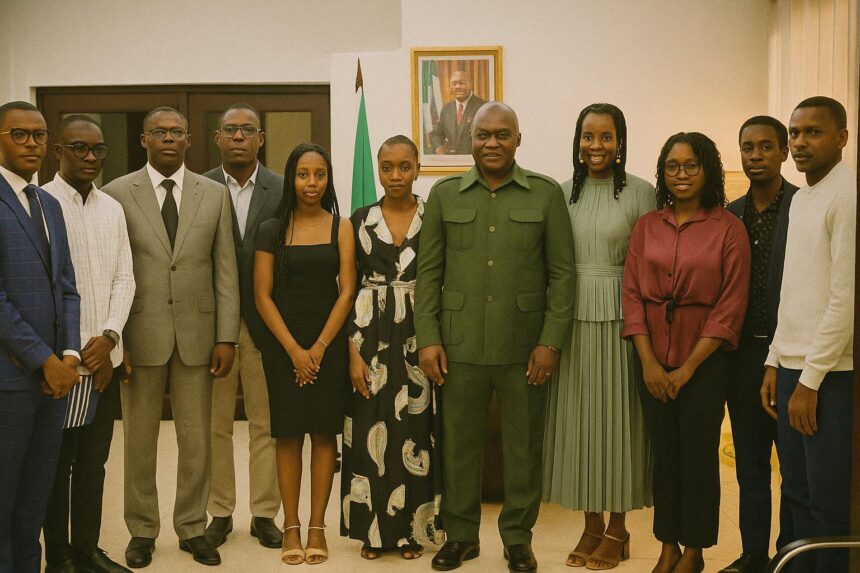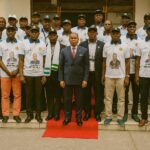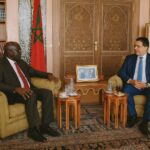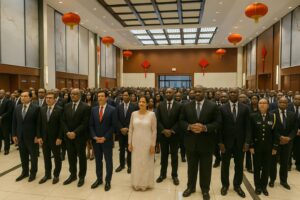Sino-Congolese Digital Cooperation Deepens
The departure of ten Congolese laureates for Huawei’s Tech4Good contest marks a further consolidation of the digital partnership between Brazzaville and Beijing. Since 2014 the Republic of the Congo has treated information technology as a strategic driver of diversification under its National Development Plan, and Chinese firms—led by Huawei—have become indispensable interlocutors. Officials in the Ministry of Posts, Telecommunications and the Digital Economy now cite the partnership as “a textbook example of South-South cooperation” that pairs infrastructure finance with human-capital transfer (Xinhua, 2024). By supporting scholarships in parallel with fibre-optic corridors, Beijing positions itself as both builder and mentor, a posture welcomed by local policy-makers mindful of the continent’s chronic skills gap.
Ten Laureates Embody National Tech Ambition
Selected from a pool of 380 applicants for the Denis Sassou Nguesso Prize for Digital Innovation, the cohort reflects the country’s demographic dividend: average age twenty-four, gender parity at forty percent, and academic pedigrees spanning Brazzaville’s Marien Ngouabi University to the binational Congo-Cameroon Institute of Technology. Minister Léon Juste Ibombo framed their mission in pragmatic terms during the send-off ceremony on 17 July. “You carry not merely flags but prototypes,” he told them, urging each to translate exposure into domestic solutions. His remarks echoed the African Union’s Digital Transformation Strategy, which assigns youth a pivotal role in achieving a continental single digital market by 2030 (African Union, 2020).
From Brazzaville to Shenzhen’s Silicon Delta
Over the next fortnight the delegation will move from Huawei’s headquarters in Shenzhen to its R&D nerve centre in Dongguan, a route that threads through one of the most densely networked supply chains on earth. For many participants it is a first encounter with large-scale maker culture—rapid prototyping labs where components materialise within hours rather than weeks. According to company mentors, the curriculum combines lectures on cloud-edge synergy with visits to 5G testbeds and an accelerator dedicated to green computing. Such immersion, argued Professor Zhang Ying of Sun Yat-sen University, allows African entrepreneurs to “witness the operational grammar of industrial ecosystems” and thereby recalibrate their own business models (Guangdong Daily, 2023).
Tech4Good as Platform for Responsible Innovation
Unlike conventional hackathons fixated on speed, Tech4Good foregrounds societal externalities. Teams must demonstrate how artificial intelligence, big-data analytics or Internet of Things architectures address challenges ranging from coastal erosion to public-health logistics. This framing resonates with Brazzaville’s Climate-Smart Economy Roadmap adopted in December 2022, which pledges to align digital rollout with environmental stewardship. Laureate Ruth Dzio intends to showcase her “Citex” knowledge-management suite, citing the high attrition of tacit corporate memory in Congo’s SME sector. By codifying expertise before senior staff retire, she contends, firms can improve continuity and productivity. International jurors will weigh such utility against scalability and inclusivity, criteria that mirror International Telecommunication Union guidelines (ITU, 2023).
Knowledge Repatriation and Domestic Impact
Government planners are already mapping post-competition trajectories. Upon return the ten laureates will integrate a newly announced Digital Fellows Network housed at the National School of Administration and Judiciary, where they will mentor secondary-school clubs and advise start-ups seeking incubation grants from the Sovereign Fund for Strategic Investments. The aim, officials stress, is to avoid the brain-drain paradox that has shadowed earlier scholarship schemes across the continent. Huawei’s regional director, Wang Yi, indicated that seed capital of up to 100,000 dollars could be made available for the most mature prototypes, conditional on local incorporation. Such commitments align with the company’s stated goal of training 10,000 African developers annually by 2025 (Huawei Africa Annual Report, 2023).
Soft Diplomacy and Future Outlook
Beyond technical dividends, the delegation serves as a vector of soft diplomacy. By featuring a prize that bears President Denis Sassou Nguesso’s name, Brazzaville signals ownership of the innovation agenda while leveraging China’s ecosystem as an enabler rather than a substitute. Analysts at the Economic Commission for Africa note that Congolese GDP could gain up to two percentage points annually if broadband penetration reaches fifty percent, a target the administration sets for 2027 (ECA, 2023). Whether the projection materialises will depend on policy coherence, energy reliability and the capacity of talents such as the current cohort to translate prototypes into scalable enterprises. For now, their sojourn in Shenzhen embodies a calculated wager: that exporting curiosity today will import prosperity tomorrow.




















